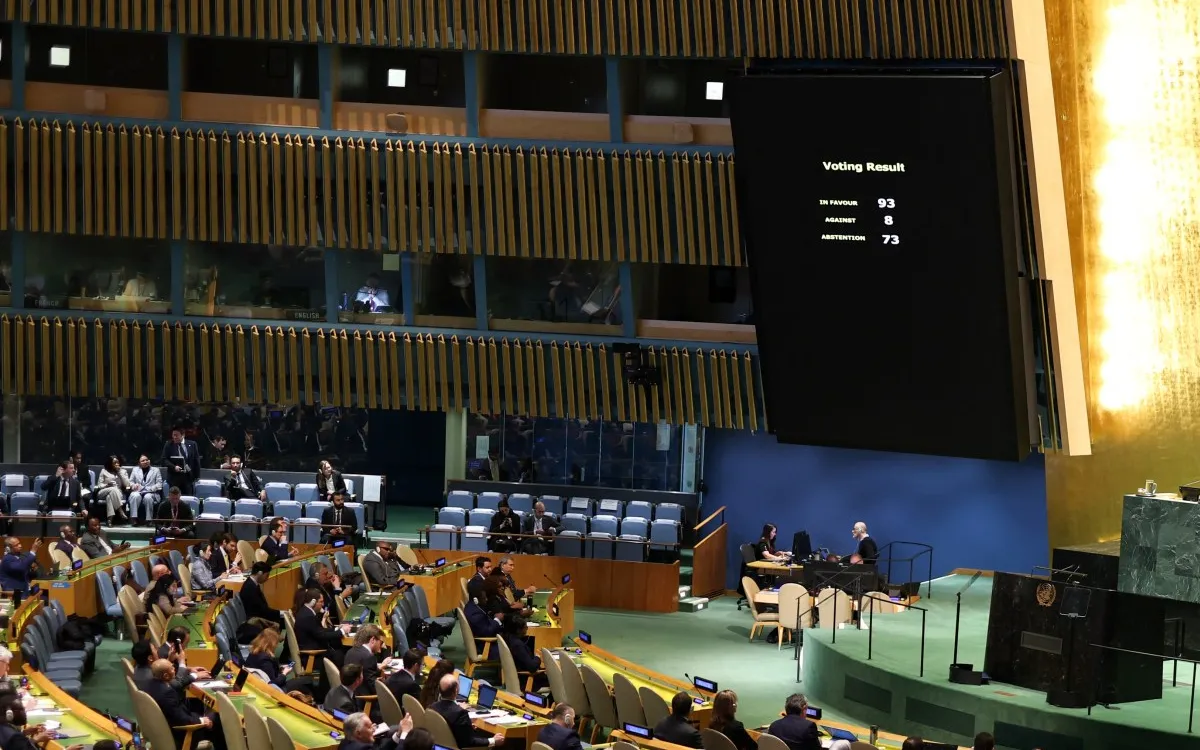
On Monday, the United States took a significant step away from its European allies by choosing not to hold Russia accountable for its invasion of Ukraine during three United Nations resolutions intended to resolve the ongoing conflict. This decision marks a notable shift in the diplomatic approach of the US compared to its European counterparts.
In the UN General Assembly (UNGA), a resolution was proposed to "advance a comprehensive, just, and lasting peace in Ukraine." This resolution emphasized the need for de-escalation, the early cessation of hostilities, and the peaceful resolution of the war. The resolution passed with significant support from various nations, indicating widespread international desire for peace in the region.
The UN Security Council adopted a resolution drafted by the US, titled The Path to Peace, which called for an immediate end to the conflict and advocated for lasting peace. Notably, this resolution did not directly accuse Russia, presenting the conflict in neutral terms as a war between Moscow and Kyiv. This approach highlights a diplomatic strategy focused on mediation rather than confrontation.
Interestingly, the US chose to abstain from voting on its own competing resolution at the UNGA after amendments were introduced to strengthen the language condemning Russia. This abstention underscores the complexities and diplomatic considerations at play in addressing the conflict.
The following breakdown illustrates how each country voted on the first of the three resolutions, which called for the cessation of hostilities in New York City on Monday:
For (93 Countries)A: Albania, Andorra, Antigua and Barbuda, Australia, Austria
B: Bahamas, Barbados, Belgium, Belize, Bhutan, Bosnia and Herzegovina, Bulgaria
C: Cabo Verde, Cambodia, Canada, Chile, Comoros, Croatia, Cyprus, Czech Republic
D: Denmark, Djibouti
E: Egypt, Estonia
F: Fiji, Finland, France
G: Gambia, Germany, Greece, Guatemala, Guyana
I: Iceland, Indonesia, Ireland, Italy, Ivory Coast
J: Jamaica, Japan, Jordan
L: Latvia, Liberia, Liechtenstein, Lithuania, Luxembourg
M: Malaysia, Maldives, Malta, Mauritius, Mexico, Moldova, Monaco, Montenegro, Myanmar
N: Nauru, Nepal, Netherlands, New Zealand, Nigeria, Norway
P: Papua New Guinea, Peru, Philippines, Poland, Portugal
R: Romania
S: Saint Kitts and Nevis, Saint Lucia, Samoa, San Marino, Serbia, Seychelles, Sierra Leone, Singapore, Slovakia, Slovenia, Solomon Islands, Somalia, South Korea, Spain, Suriname, Sweden, Switzerland
T: Thailand, East Timor, Tonga, Trinidad and Tobago, Tunisia, Turkiye
U: Ukraine, United Kingdom, Uruguay
V: Vanuatu
Against (18 Countries)B: Belarus, Burkina Faso, Burundi
C: Central Africa Republic
E: Equatorial Guinea, Eritrea
H: Haiti, Hungary
I: Israel
M: Mali, Marshall Islands
N: Nicaragua, Niger, North Korea
P: Palau
R: Russia
S: Sudan
U: United States
Abstention (65 Countries)A: Algeria, Angola, Argentina, Armenia
B: Bahrain, Bangladesh, Botswana, Brazil, Brunei
C: Chad, China, Colombia, Costa Rica, Cuba
D: Dominican Republic
E: El Salvador, Ethiopia
G: Gabon, Ghana, Grenada, Guinea
H: Honduras
I: India, Iran, Iraq
K: Kazakhstan, Kenya, Kiribati, Kuwait, Kyrgyzstan
L: Laos, Lebanon, Lesotho, Libya
M: Malawi, Mauritania, Micronesia, Mongolia, Mozambique
N: Namibia, North Macedonia
O: Oman
P: Pakistan, Panama, Paraguay
Q: Qatar
R: Rwanda
S: Saint Vincent and the Grenadines, Sao Tome and Principe, Saudi Arabia, Senegal, South Africa, Sri Lanka, Syria
T: Tajikistan, Togo, Tuvalu, Tanzania
U: Uganda, United Arab Emirates, Uzbekistan
V: Vietnam
Y: Yemen
Z: Zambia, Zimbabwe